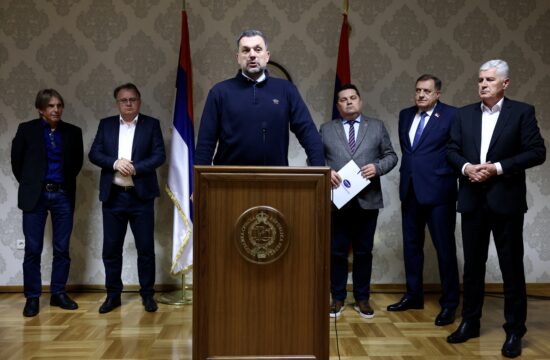
Bosnia and Herzegovina “is and remains a united country with two entities and three constituent peoples” and talks about the secession of its Serb-majority Republika Srpska (RS) entity “are not only unhelpful, they are also a distraction from the real issues that need to be tackled,” BiH NATO Headquarters Commander General, Eric Folkstad, told the Fena news agency.
“What is needed is cooperation, at every level within BiH, to implement the needed reforms that will make the future safer, more secure and more prosperous. That is where NATO and its allies encourage all parties to focus their efforts,” he said, adding, “the people I speak to in every corner of BiH just want to be able to provide a better future for their families. They want peace, security, prosperity and opportunities – it's up to leaders at all levels to deliver on that.”
It goes without saying that BiH faces security challenges, as every country does, Folkstad said, listing human migration, Covid-19, disinformation and corruption and arguing that “BiH is on the front lines of all of it.”
“NATO and its allies will continue to help and we also encourage the authorities, at all levels, to approach these problems with a spirit of cooperation and compromise and to act for the common good, he said.
Failure to do so has “knock-on implications” – for example for jobs, wages and the economy, he said, explaining that investors “want security, political stability and to know that the law is respected and enforced openly and fairly: that's what gives them the confidence to invest and create jobs, raise standards of living and make life better for the people of BiH.”
“My team and I, and the Ambassadors from our NATO allied nations, constantly advocate for reforms in these areas. More generally, the challenges we are facing are too big and too complicated for one country to tackle alone. That is why partnerships, like the one BiH has with NATO, and regional cooperation are so important. And it's also what NATO does best: we bring nations – even those who are not members, like BiH and Serbia – into our discussions every day. And, when a crisis hits, we are there to support each other.”
Folkstad explained that NATO is was invited to BiH by the authorities “to provide advice and assistance as they work to improve and modernize the operations of the Ministries of Defence and Security, as well as the armed forces.”
“This means providing them with advice on force structure, manpower, training and ways of making the whole system more transparent and accountable to the public.”
Much of the practical focus of NATO in Sarajevo is helping the Defence Ministry establish a Light Infantry Battalion in BiH Armed Forces that is fully manned, equipped and trained to international standards, he said.
“We also work with our NATO allies, to help synchronize the bilateral donations and activities to improve the Armed Forces. However, to me, it is people that are the foundation and the soul of the Armed Forces and when you look after your people good things happen and everything else will fall into place. So I'm here to advocate for changes that will make life better for the soldiers and officers of AFBiH and their families,” he said.
Bosnia’s Armed Forces has come a long way, “but the system undeniably presents challenges and frustrations for the men and women who serve in the military- just as it does for people across BiH in their everyday lives,” he said.
“But the commitment and dedication of the armed forces in the face of those challenges is awe-inspiring! I'd like to see changes which reward that devotion. My team and I are focused on trying to help improve the Armed Forces and foster a system that serves everyone in BiH and that young people want to be part of so they stay here. One where the best candidates are able to apply for promotion, and don't have to worry about taking a pay cut during training; where women can play a full and active role in the Armed forces to protect BiH and its people; and where the armed forces are able to provide better healthcare, accommodation and career opportunities for its people,” he said.
Folkstad also spoke about the wildfires across BiH and the country’s capabilities in responding to such disasters.
Recently, local authorities in the Jablanica area requested help from the Armed Forces, asking it to send helicopters to respond to a wildfire that was raging across the area. However, any engagement of BiH army resources requires approval from the tripartite Presidency.
The Presidency, more specifically Serb Presidency member, Milorad Dodik, did not agree to this. He later stated to media that Bosnia’s helicopters are not safe and that it would be risky to engage them.
Folkstad said he recently visited the 2nd Helicopter Squadron at Rajlovac.
“As a military helicopter pilot with 25 years flying experience – including UH-1H, the same aircraft that AFBiH use – I can say, with total confidence, these aircraft are fully operational, well maintained and flown by qualified and experienced crews. I've met with them and they are trained, ready and eager to fly in any civil support mission where they are called on,” he said.
“In addition to seeing it for myself, I have an Army Aviation technical expert as part of my team here, and he spends almost all his time with the AFBIH Squadrons, and provides me with regular updates on their capabilities,” he added.
“We now have over 70 Square Kilometers burned throughout BiH and I would have preferred to see these military assets in the air along with the RS helicopter service – I think more assets would have meant less land burned. Every unit in the AFBIH has a mission statement which includes the phrase “and by order provides assistance to civilian authorities during natural and other disasters.” These guys are here and they are ready to do it whether it is fires, search and rescue, or any medical evacuation,” he said.
The AFBiH has together with the US Army completed its largest bi-lateral exercise ever, Immediate Response, this summer, and according to Folkstad, “it was a huge success and the AFBIH showed that are equally capable and experienced and are just as committed and professional.”
“They were true ambassadors for BiH and they, and everyone in BiH, should be proud of what they have achieved,” he added.
Work is also continuing on creating a Light Infantry Battalion in BiH which would be fully capable of operating with NATO standards and procedures and officially recognized as “combat ready” and the next big test of progress will be the Self Evaluation Level 2 exercise, that will take place in September, he said, adding that he and his team are “very optimistic” about it.
“I spoke earlier about support to civilian authorities. The armed forces doesn't just have firefighting capabilities, they have tremendous capabilities to respond in the event of earthquakes, floods and other disasters, and were very active – for example in helping to disinfect public institutions – at the start of the COVID pandemic. I recently visited Orasje where soldiers were training to help the public if BiH suffers from flooding and I have seen training and capabilities across the country that will bring direct benefits to citizens of BiH should disaster strike,” he said.
“I have visited every Brigade in AFBiH, and on every visit, I am continuously impressed by their commitment and positivity. Like all public institutions, they are constrained by the system, but the soldiers and officers – from different backgrounds and parts of the country – all pull together to make it work. That's what makes AFBiH a model institution of inclusivity of all people – and the results are impressive,” he added.





Kakvo je tvoje mišljenje o ovome?
Učestvuj u diskusiji ili pročitaj komentare